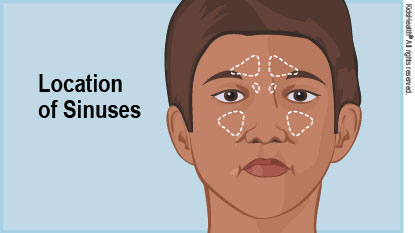Sinus Infection: How to Care for Your Child
A sinus infection (also called sinusitis) is an infection in one or more of the sinuses. Sinuses are hollow spaces in the cheekbones, in the forehead, and behind the nose. The infection is usually caused by bacteria or a virus (types of germs). Most people who have a sinus infection had a cold first.
Treatment for a sinus infection may include antibiotics, allergy medicines, saline (saltwater) sprays or washes, and steroid (medicine to ease swelling) nasal spray.
Follow these instructions to care for your child.


-
Follow your health care provider's instructions for giving any medicines:
-
If antibiotics were prescribed, be sure to give your child all of the doses as directed, even if he or she is feeling better.
-
Use any nasal sprays as directed.
-
If a saline nasal spray was prescribed, use the spray or wash before any other nasal sprays.
-
If you are giving acetaminophen (Tylenol®, Panadol®, or a store brand) or ibuprofen (Advil®, Motrin®, or a store brand) for pain or fever, be sure to follow dosing instructions on the package.
-
Don't give aspirin to kids or teens. It's been linked to a rare but serious illness called Reye syndrome.
-
Don't give cough or cold medicines to children younger than 6 years old. They can be dangerous in young children.
-
Offer your child plenty of liquids to drink.
-
Let your child rest as needed.
-
To help your child feel more comfortable while sleeping, try:
-
People who are exposed to cigarette smoke are more likely to get sinus infections. Make your home and car smoke-free. Visit www.smokefree.gov or call 1-800-QUIT-NOW for help.

Your child:
-
has a fever of 100.4°F (38°C) that lasts more than 3 days, or if the fever goes to 102°F (38.9°C) or higher
-
isn't improving after 3 days
-
has new or worsening symptoms

Your child has:
-
changes in vision or pain with eye movements
-
neck pain and/or stiffness or a severe headache
-
bulging eyes or severe swelling around the eyes

How does a sinus infection happen? When your child or teen has a cold or allergies, nasal passages and sinuses become swollen and make more mucus than usual. A sinus infection is when mucus gets infected with bacteria, viruses, or fungi (types of germs).
Do kids with a sinus infection always need antibiotics? Some sinus infections get better on their own. Depending on symptoms and how long someone has been sick, health care providers may not prescribe antibiotics right away.
What are the symptoms of a sinus infection? Kids with a sinus infection may have a cough, a runny nose, fever, a sore throat, bad breath, a headache, and nausea or vomiting.